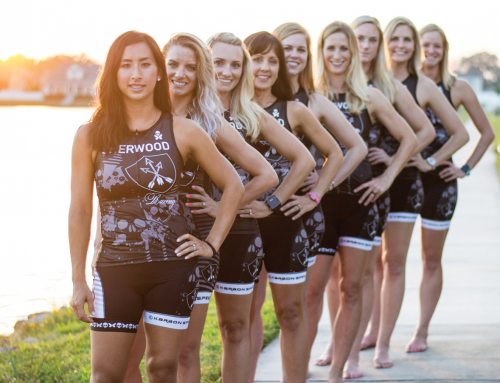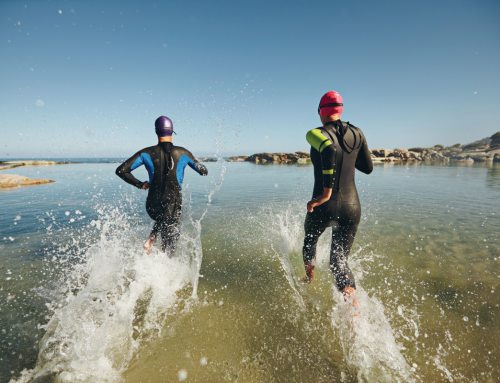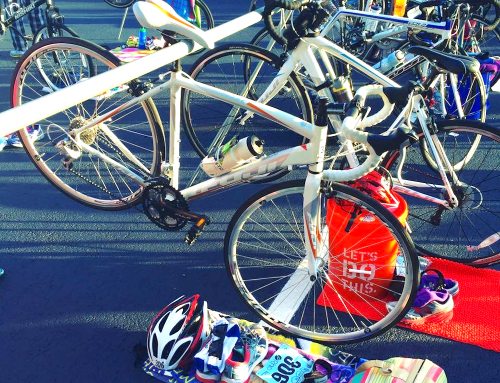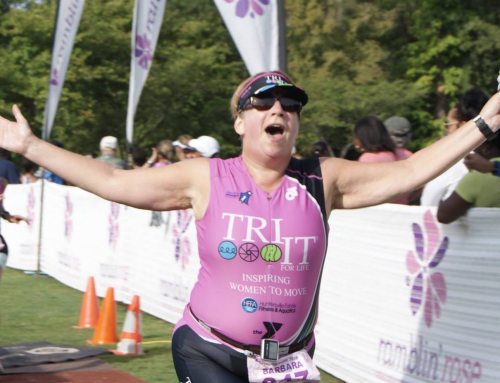By Grandison Burnside and Cyndi Dambacher
“I’m so slow.” “I’m terrible at this.” “I can’t keep up.” “I can’t do this.” If these phrases creep into your mind during training, you are not alone. Internal words might seem like innocuous rambling in our heads to which we have become accustomed, but the way we speak to ourselves is a critical component to motivation and performance. While occasional self-doubt is inevitable and, perhaps, a critical component of motivation, experts have determined that negativity is detrimental to an athlete’s overall performance.
Ed Acevedo, Ph.D. Professor and Chair, Department of Kinesiology and Health Sciences, Virginia Commonwealth University, states: “It is very common for some level of stress to be associated with facing an important challenge or goal. This anxiety can feed your level of physical readiness and prepare you for maximal effort, however, this anxiety can also lead to an upset stomach, a headache, muscle tension, and fatigue. In addition, this anxiety can undermine your confidence. Nonetheless, a focus on what you can control will often reduce the negative effects of anxiety.”
So what can you do to reduce these negative effects? In order to change our internal language from negative to positive, we suggest considering why you are talking negatively to yourself regarding training and racing. We have found that getting to the source of the negativity has helped our athletes determine how to best change their approach.
Once you recognize the source of self-doubt and negativity, try implementing any of the suggestions below:
1. If your negative self-talk is truly grounded and you’re worried about a specific aspect of a racing or your training, consider what you can do to overcome that obstacle. If you have a fear of the open water, find specific training programs which will help you to become more confident in the open water. Worried about having a flat tire on the bike? Find someone to teach you how to change a flat. Concerned about your nutrition on the run? Make a conscious decision to research and experiment with different nutrition options.
2. Implement 30-second positive self-talk intervals and visualizations into your training.
When you’re in the water, for every 100 that you do, spend 25 yards/meters imagining yourself as smooth and streamlined and one with the water and as natural as a dolphin in the ocean.
When you’re on the bike and you are struggling, imagine yourself riding strong, with a fluid cadence and the wind at your back.
When you’re running and your rhythm or pacing is off, for one block every mile try visualizing yourself running lightly with effortless grace and good form.
Talk to yourself as you would if you were to encourage a friend: “You look great!” “Way to go!” “Keep going!”
3. Find your ONE WORD, your mantra or your inspiration word that you will allow to guide you in your goals. This word can be anything – a feeling, a thought, an action word. A few ideas from our TRIgirl and TRIquest athletes are words such as Calm, Challenge, Courage, Endure, Flow or mantras such as “Relax, Breathe, Refocus”.
4. Find gratitude. Even when it is difficult, there is always something for which we need to be grateful. TRIgirl and TRIquest athletes unanimously expressed that gratitude is the best motivator and inspiration for pushing oneself through tough workouts. In the words of one of our athletes: “In a lot of those long miles I tried to make a gratitude list, going through the alphabet as many times as I needed. When I found myself practicing gratitude, the miles just seemed to melt away.”
5. Leave on a high note! For every workout you complete, no matter how tough it was, or if you didn’t meet your goals or expectations, finish your workout strong. Even if you have to fake it, put a smile on your face and imagine yourself as strong for that last 50 meters in the pool, the final 1/2 mile of your bike, or the last block of your run, because how you leave your last workout will be how you go into your next. Make it positive!
Implementing some of these techniques into your training will leave you feeling strong, encouraged, confident and ready to take on your goals! Happy training!
# # #
Grandison Burnside and Cyndi Dambacher are owners of TRIgirl and TRIquest Training in Richmond, VA. They are Level I USA Triathlon Certified Coaches, USA Cycling Coaches and have finished over 15 combined Ironman races and countless marathons. They are skilled at teaching athletes how to excel in the sport while maintaining a healthy and balanced life. Visit TRIgirlTRIquest.com for more information.








